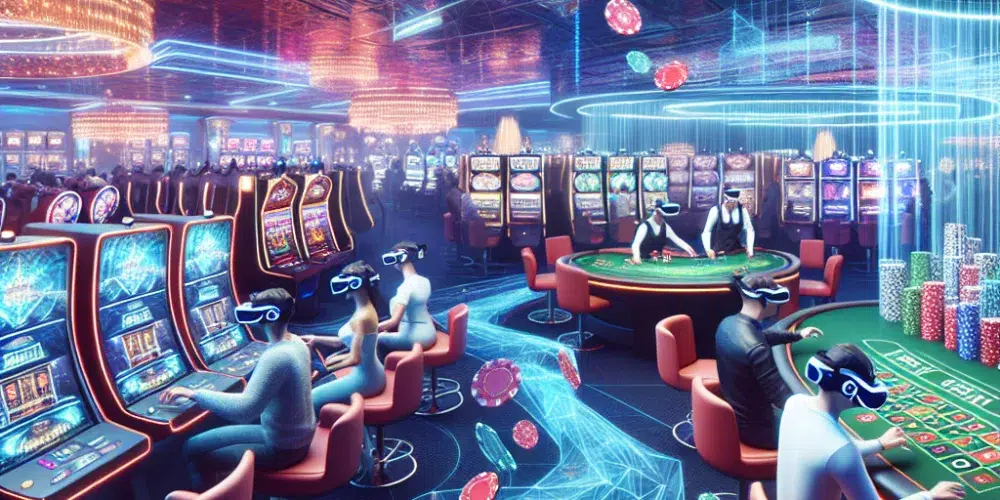In the fast-evolving world of casino gaming, where traditional play meets cutting-edge technology, 2024 is set to be a landmark year with the advent of Virtual Reality (VR) casinos. These immersive platforms are transforming the gambling experience, offering players the thrill of Vegas-style gaming from the comfort of their homes. This breakthrough is not just enhancing user engagement but also rewriting the rules of casino economics and player interaction.
The Evolution of VR Casinos
Virtual Reality technology has been on the fringe of mainstream gaming for a number of years but only recently has it penetrated the casino industry with significant impact. Early VR experiments were often criticized for their clunky hardware and lack of engaging content. However, 2024 has seen major advancements in both hardware capabilities and software development, providing users with an unprecedented level of immersion and interaction.
Companies like Oculus and Valve have introduced lighter, more comfortable headsets with improved graphical fidelity, making prolonged gaming sessions in VR more appealing. On the software side, casino game developers have crafted detailed, interactive casino environments that mimic the atmosphere of real-world casinos, complete with detailed slot machines, card tables, and even other players.
The Impact on Player Experience
The allure of VR casinos lies in their ability to provide a full-sensory experience. “When you put on the VR headset, you’re not just playing a game, you’re entering a casino,” explains Jonathan Reed, a virtual reality gaming consultant. “From the clinking sounds of slot machines to the soft felt of the gaming tables, every detail is designed to mimic the real thing.”
This level of realism is not just about visual aesthetics; it extends to the gameplay itself. Players can interact with their environment – picking up cards, pulling slot machine levers, or rolling dice – all through motion capture technologies that translate real-world actions into the game. This has not only enhanced accessibility, making the games feel more intuitive but has also increased the engagement and retention rates among players.
Business Implications and Market Growth
From a business perspective, VR casinos are a game-changer. They offer casino operators a new way to attract younger demographics who might not be interested in traditional forms of gambling. Moreover, VR allows for global accessibility, overcoming the geographical and regulatory constraints faced by many physical casinos.
The market response has been overwhelmingly positive. According to a report by Grand View Research, the VR gambling market is expected to grow at a compound annual growth rate of 17% from 2023 to 2030. This growth is attributed not only to technological advancements but also to an increasing appetite for immersive and interactive entertainment options among consumers.
Challenges and the Road Ahead
Despite the promising outlook, VR casinos face significant challenges. The high cost of VR equipment and the need for a robust internet connection remain barriers to widespread adoption. Furthermore, regulatory issues, particularly concerning gambling laws that vary dramatically between jurisdictions, could also pose challenges to global deployment.
Looking ahead, the focus for developers will be on overcoming these barriers and enhancing the social aspects of VR casino games. Upcoming features include multiplayer games, live dealer interactions, and real-time chat functionalities, which could revolutionize the way players experience online casinos.
Key Takeaways
– Immersion and Realism: VR casinos offer an unprecedented level of immersion, recreating the sensory experiences of real-world gambling.
– Market Growth: With a projected CAGR of 17% from 2023 to 2030, VR casinos represent a rapidly growing segment within the broader casino market.
– Accessibility and Engagement: These platforms attract a wider, more globally dispersed audience and significantly improve player engagement through interactive gameplay.
FAQs
Q: What equipment is needed to access VR casinos?
A: Users typically need a VR headset, compatible controllers, and a sufficiently powerful computer or gaming console to handle the high-definition graphics.
Q: Are VR casinos regulated?
A: Yes, like all forms of gambling, VR casinos must comply with local gambling laws, which can vary widely between jurisdictions.
Q: Can you win real money in VR casinos?
A: Yes, many VR casinos offer games with real money betting options, subject to the same laws and regulations as traditional online gambling sites.
As VR technology continues to develop and become more accessible, Virtual Reality casinos are poised to become a cornerstone of the gambling industry, offering players a novel and exciting way to gamble that was unimaginable just a decade ago.

David Harrison stands tall in gambling journalism, marrying his firsthand casino experiences with a deep understanding of betting psychology. His articles transform complex gambling jargon into engaging tales of strategy and chance, making the world of betting accessible and enjoyable. David’s knack for narrative extends beyond print, making him a sought-after speaker on gambling trends and future bets. In the realm of gambling, David is both a scholar and a storyteller, captivating readers and listeners alike.


